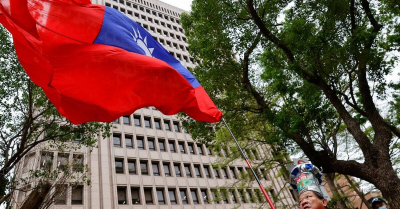Reuters-Beijing frets over Taiwan opposition split as parties go on the attack over China ties
November 27, 2023 3 min 585 words
这则报道揭示了中国对台湾反对党分裂的担忧,尤其是在选战加剧中。台湾两大亲华反对党未能达成联合总统候选人协议,增强了执政的民进党在民调中的领先地位。中国方面表态称希望选举结果有助于维护和平稳定,但社交媒体上却充满对反对党不团结的失望。一些中国微博评论呼吁团结,但也有人感到绝望,认为这是对两岸和平的损失。这一局势使得台湾选情更加复杂,也引发了中国社交媒体上的激烈讨论。在这场政治博弈中,中共对台政策的挑战显而易见,而台湾的民主制度则经受着严峻考验。
Beijing is fretting that a split in Taiwan's opposition could pave the way for the island's ruling party - which the Chinese government despises - to stay in power, as China took centre stage in election campaigning over the weekend.
China, which claims Taiwan as its own territory, looms large over the Jan. 13 presidential and parliamentary election as it has ramped up military pressure against the island.
Last week, negotiations for a united presidential ticket between the two main opposition parties, which seek closer ties with China, imploded, giving a boost to the ruling Democratic Progressive Party (DPP), already leading opinion polls.
China's official response so far has been a brief statement from its Taiwan Affairs Office late Friday saying it hopes the election result will help maintain peace and stability, and reiterating that Taiwan faces "a choice between war and peace".
But on Chinese social media, the drama has been followed with a sense of despair at the opposition's disunity.
Zhang Xuesong, director of strategic research at Chinese think tank CICG Asia-Pacific, wrote on his Weibo social media account that the disintegration of the talks was a "loss for cross-Taiwan Strait peace".
"That was an extremely frustrating day," he added. "Of course, the only thing that gives us confidence is that Taiwan is one step closer to finally being reunified."
Other Chinese Weibo accounts that follow Taiwan have been similarly despondent.
State-run Shenzhen Television wrote that the breakdown in talks signalled "a chaotic battle" to come in the election.
One Chinese Weibo user wrote simply: "I saw news that the talks broke down, and now I've lost hope."
The DPP has defied Chinese pressure. Beijing views DPP presidential candidate Lai Ching-te as a separatist and has rebuffed repeated offers of talks from both him and Taiwan President Tsai Ing-wen.
Speaking at a campaign rally on Sunday night in Taipei's sister city New Taipei, Lai said that if Taiwan accepts it is part of China - Beijing's bottom line for talks - it will lose sovereignty.
"With no sovereignty, you will have no ownership over your land, your homes," Lai said.
Hou Yu-ih, the candidate for Taiwan's largest opposition party, the Kuomintang (KMT), told his supporters that a vote for Lai was a vote for war and only he could bring peace. Lai and the DPP strongly dispute that point of view.
On Monday, China's Taiwan Affairs Office repeated its attacks on Lai and running mate Hsiao Bi-khim, formerly Taiwan's de facto ambassador to the United States.
Lai and Hsiao "distorted facts and downplayed the harmfulness and danger of 'Taiwan independence' separatist activities to deceive voters in the 2024 leadership election in Taiwan", it said.
Opinion polls since the opposition talks collapsed have given a mixed picture.
The Taiwanese Public Opinion Foundation said that just more than half of respondents to the question of who they regarded as having the "best prospects" of winning answered Lai.
Television station ETtoday put Lai at about 35%, with Hou nipping at his heels with 33% and former Taipei mayor Ko Wen-je from the small Taiwan People's Party at 21%.
A split opposition gives Lai an increased chance of victory in Taiwan's first-past-the-post system. In 2020's election, the DPP won in a landslide, taking 56% of the vote, but only had to face one main opponent, the KMT's Han Kuo-yu.

